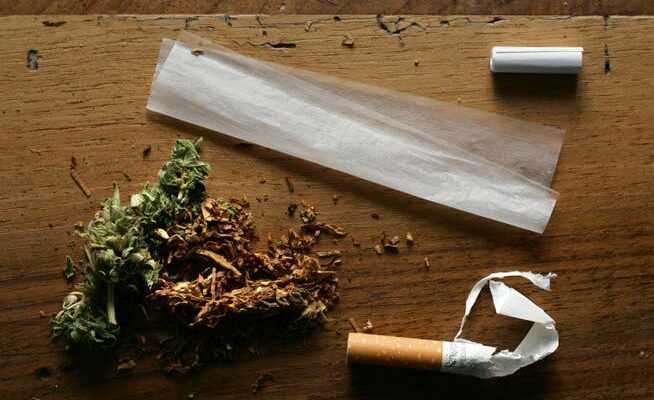For years, cities have struggled to be able to conduct trials of legal cannabis dispensing. The Federal Office of Public Health is now giving the green light for the first time.
Tobacco, hemp and cigarette paper – the joint is ready.
A quick stop at the pharmacy in the evening after work before closing time and legally buying a joint or two – this will soon become routine for around 400 cannabis lovers in Basel from late summer. For the first time in Switzerland, a broad-based study is being carried out in the canton of Basel-Stadt to examine cannabis consumption behavior.
The Federal Office of Public Health (BAG) on Tuesday approved the first of several pilot tests with which various cities want to analyze the consequences of legal cannabis sales. Cities have been working toward these trials for years. The Basel project will initially take two and a half years, after which a balance will be drawn.
Cannabis is produced in Aargau
The study is being carried out by the University Psychiatric Clinics in Basel and the University of Basel in cooperation with the Department of Health. The almost four hundred participants can buy various products such as cannabis blossoms or hashish in certain pharmacies and get advice beforehand.
The products are manufactured in Switzerland by a supplier from Zeiningen (Aargau), which has an exceptional permit from the federal government. Every six months, the participants are asked about consumer behavior and well-being. The researchers want to find out how buying cannabis through a controlled channel affects the amount consumed, physical and mental health, or the black market.
The Basel-Stadt health department does not fear a run on a test site, as Lavinia Flückiger from the addiction department explained to the NZZ. On the one hand, participation is linked to various requirements. Only adults residing in Basel are allowed to take part. There are also health requirements. And finally, participation is not worthwhile financially either: prices have to be paid for the cannabis in the pharmacy, which are based on those on the black market. This is what the law provides, not least to counteract resale on the street.
In Basel, this corresponds to CHF 7 to 20 per gram, depending on the type and quantity. The pricing was not easy, explains Flückiger. When asked, she did not want to say exactly how much the cannabis costs in the Basel pharmacies. The products are sold in ready-made packages, with a maximum total THC content of 10 grams per month and person.
Zurich wants “social clubs”
Other cities are also working flat out on cannabis studies: Cannabis products are expected to be legally available in Zurich from autumn. It is planned here that cannabis can be bought not only in pharmacies, but also in so-called social clubs. These are consumer clubs yet to be founded with their own localities.
The study is intended to show what effects the controlled sale of cannabis, coupled with prevention offers, has on consumers and public health. The health risks for consumers should be kept as low as possible. Ideally, consumers would switch to products with a lower active ingredient content during the study period, the city of Zurich explained last September. However, the approval of the BAG is not yet available.
The current legislation has been causing problems for the cities for years: Despite the ban, cannabis is consumed practically unchecked. Since 2013, adults caught with less than 10 grams of cannabis only have to pay one fine. However, the resources to really enforce the law are lacking. However, a more extensive liberalization of cannabis consumption has so far not proved to be able to win a majority in Switzerland: in 2008, a popular initiative to legalize cannabis consumption was rejected by 63 percent of voters and by all cantons. However, that didn’t change the fact that people in Switzerland continued to smoke weed happily, without any herb growing to counteract it.
Legal back and forth
The cities of Zurich, Geneva, Basel, Bern and Winterthur were therefore looking for loopholes in the Narcotics Act (BetmG) so that they could at least sell cannabis as part of scientific experiments. Years of legal back and forth followed – until Parliament revised the BetmG a year and a half ago. Local and time-limited scientific pilot trials of cannabis are also permitted.
Not only the cities make use of the new possibility. The Association Cannabis Research, who is initially supported by politicians mainly from the centre-left camp, has also planned several attempts. The association attaches great importance to conducting quantitative research, as the association’s president Paul-Lukas Good explains to the NZZ: The data from test subjects with legal access would be compared with that of a control group that procured the cannabis on the black market. This is a valuable addition to the city trials.
However, it will be several years before the research results are evaluated. However, the long-term goal seems clear: the ban on cannabis, which becomes less enforceable the longer it gets, is to be replaced by a legal regulation that enables legal and controlled acquisition of cannabis – as is already the case with other addictive substances.
